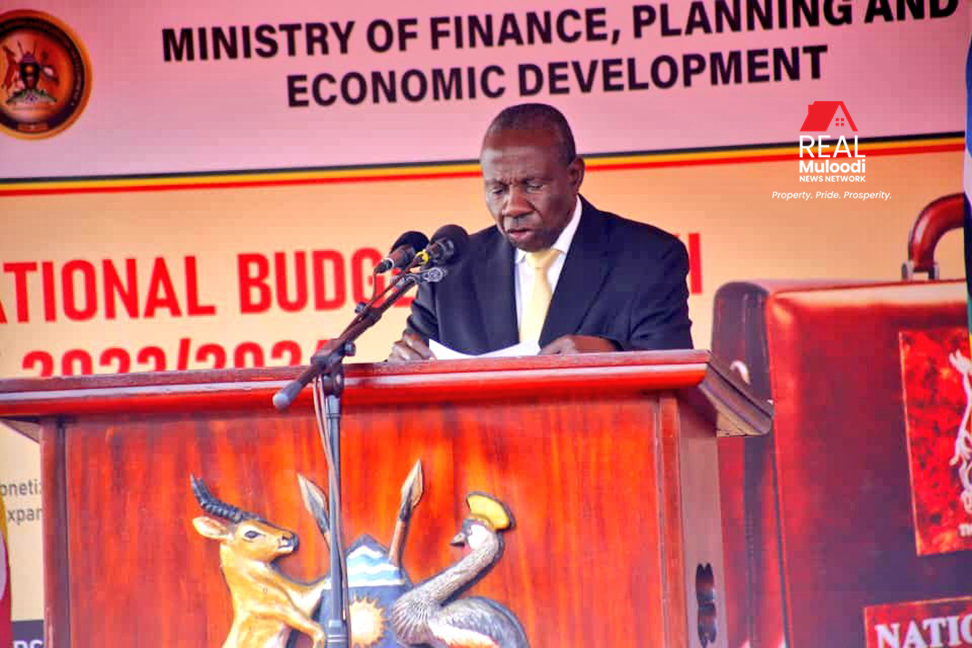UGANDA, Kampala | Real Muloodi News | Uganda’s economy has fully recovered, recording a six percent growth over the past financial year, which has garnered praise from the European Union (EU) and the World Bank (WB). This growth surpasses the regional average, positioning Uganda as a leading investment destination in Africa.
Ms. Caroline Adriaensen, EU Head of Cooperation, acknowledged Uganda’s strong economic policies and fiscal discipline.
“We agree with some of the risks and challenges identified, notably the need to increase domestic revenue mobilisation, the need to intensify the fight against corruption, and the need to limit domestic borrowing at high interest rates,” she said.
She also welcomed the strategic priorities for the next financial year, which include investment in human capital, agro-industrialisation, tourism, mineral development, rail and water transport, and a focus on environment and climate change.
“These priorities align with the EU’s partnership with Uganda, supporting the private sector, trade, agribusiness, and sustainable tourism,” Adriaensen added.
Ms. Rachel Kaggwa Sebudde, a WB economist, highlighted the budget’s focus on human capital development, health, water, and sanitation.
She stressed the importance of effectively using the country’s minerals for development and appreciated the infrastructure investments benefiting agricultural development.
“More needs to be done since the population is growing fast, calling for more schools, jobs, and skills,” Sebudde said.
She emphasised the need for increased domestic revenue mobilisation and expanding the taxation net to reduce stress on current taxpayers. Sebudde also called for climate-smart agriculture to manage changing weather patterns.
Finance Minister Matia Kasaija announced that Uganda’s economy is projected to achieve a steady-state growth potential of between 6.4 percent and 7.0 percent in the next financial year, before reaching double-digit growth over the next five years.
“I am pleased to report that Uganda’s economy has fully recovered from various internal and external shocks,” Kasaija said, projecting GDP growth of six percent for FY2023/2024 compared to 5.3 percent in FY2022/2023. This growth exceeds the sub-Saharan Africa average of 3.8 percent and the global average of 2.9 percent for 2024.
Minister Kasaija forecasted the country’s GDP to expand to USh225.5 trillion ($60 billion) during FY2024/2025, excluding anticipated oil and gas revenues.
“This growth will be driven by increased oil and gas activities as we move towards first oil production in FY2025/2026; growth in exports supported by regional trade in the EAC and Comesa, intra-Africa trade, and new trading partners in the Middle East and Asia,” he said.
The 2024/2025 budget aims to address Uganda’s debt while ensuring economic stability through internal revenue mobilisation.
According to Finance Minister Matia Kasaija, additional domestic revenues will be generated from compliance measures undertaken by URA. These include use of Electronic Fiscal Receipting and Invoicing System (EFRIS), Digital Tax Stamps (DTS) and the Rental Tax Compliance System (rTCS).
John Bosco Kalisa, Executive Director of the East African Business Council (EABC), noted that Africa’s debt is used for productive sectors like roads and railways, and the debts in the East African Community (EAC) are manageable.
“EAC needs concessional loans where debts are cheaper, and the discussions are going well,” Kalisa said.
Herbert Byaruhanga, President of the Confederation of Uganda Tourism Association, urged the government to increase training, expand foreign markets, and appoint Uganda tourism ambassadors abroad to boost the tourism sector.
The government has promised to support tourism through investment in infrastructure, branding, marketing, and the Meetings, Incentives, Conferences and Events (MICE) Programme.
David Walakira, Executive Director of the Centre for Budget and Tax Policy (CBTP), praised the budget’s transparency but cautioned against premature celebration.
“The minister has done a good job in terms of health and energy, including preparatory activities for the 8,400MW nuclear power plant,” he said.
Walakira stressed the need for fiscal consolidation and creating an enabling environment for industrial growth.
He also noted that while the government provides long-term affordable capital through various programs, this approach drains resources.
“Giving direct cash is detrimental and never sustainable; the government should create an enabling environment like subsidising electricity to enable industrial growth,” he said.
The increase in tourism activities will be supported by investment in tourism infrastructure, branding, marketing, and effective implementation of the MICE Programme.
Kasaija also highlighted agro-industrialisation and light manufacturing, supported by access to affordable credit through the Uganda Development Bank (UDB), as vital to economic growth.
Investments will also be supported through the Uganda Development Corporation (UDC), the Parish Development Model, the Small Business Recovery Fund, Emyooga, the Presidential Industrial Hubs for Youth Entrepreneurs, and programs to support exporters and women enterprises.
“Our growth prospects face some risks that will need to be mitigated,” Kasaija said, citing climate change, regional and global geopolitical tensions, high interest rates, and fluctuations in global commodity prices as potential threats.
To address these risks, the government is implementing climate change adaptation measures, exploring cheaper financing sources including climate finance, and ensuring frugality in government expenditure.
Robert Mbazira, Senior Manager at Ernest and Young, described the budget as ambitious but achievable, though funding remains a challenge.
“Uganda should work within its means; budget support includes borrowing to pay salaries, indicating struggles to live within means,” he said.
Mbazira also noted concerns about corruption affecting the allocation of funds.
Uganda’s economy has fully recovered, with positive growth projections and strategic investments driving this progress.
The combined efforts of internal revenue mobilisation, prudent fiscal policies, and targeted investments in key sectors are set to sustain this growth trajectory.
READ MORE LIKE THIS:



